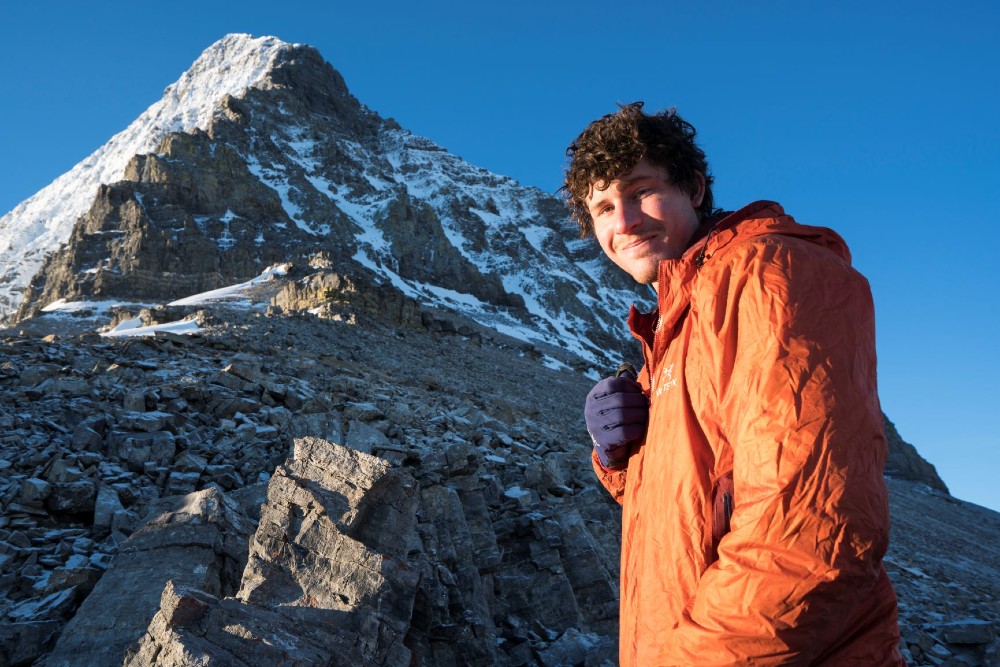
For some reason, there’s been an unquenchable interest in mountain-climbing in recent years, particularly due to the many films about the sport, hobby, activity, or however you want to label it.
Jimmy Chin and Elizabeth Chai Vasarhelyi‘s Oscar-winning documentary Free Solo about climber Alex Honnold certainly helped, but Filmmakers Peter Mortimer and Nick Rosen had been making films about mountain climbing for nearly two decades before that via their Reel Rock tour. Mortimer had even directed the excellent doc, The Dawn Wall, about a similarly amazing mountain-climbing feat that didn’t get nearly as much attention as Free Solo.
Mortimer and Rosen’s latest film, The Alpinist, tells the story of Marc-André Leclerc, another brave, young climber whose feats of free soloing perilous peaks have even impressed Honnold. Mortimer and Rosen’s cameras caught up with Leclerc in his native British Columbia, Canada to learn more about him and document some of his growing accomplishments, which culminates in a solo climb of the Cerro Torre “Corkscrew” peak in Patagonia in the freezing winter temperatures, which is unheard of.
Below the Line got on Zoom with Mortimer and Rosen to talk about Leclerc and making a film about him.
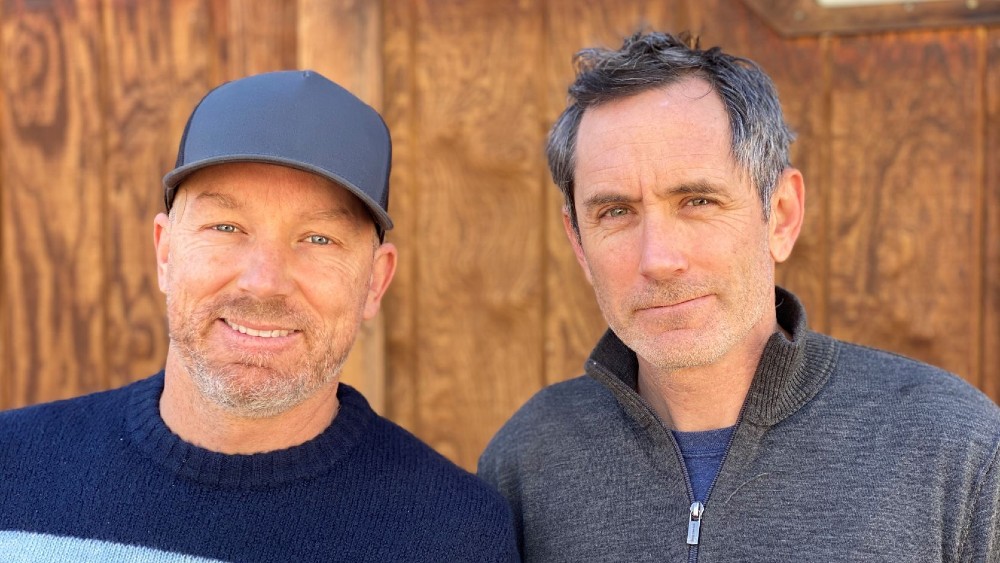
Below the Line: I wasn’t really familiar with your Reel Rock series before this, but you’ve been doing them for 20 years. How did you first get started working together and doing those?
Peter Mortimer: Nick has a background in journalism, and I had the film degree, and we were both climbers in college. We have another partner, Josh Lowell, and it was just something we’re all interested in, and it was definitely one project leads to the next. We never had, like a “Let’s build a business in this.” I think it was after about our third or fourth project where we had an audience, we’re having so much fun doing it. We were young back then, and we had people who wanted to fund the films and outlets for them, so it kind of just snowballed, and at some point, we were like, “We’re doing this!” So we started the Reel Rock tour, so that’s just become this great distribution outlet. It’s an annual distribution outlet that we run on for our films and different projects.
Nick Rosen: Not for The Alpinist, just to be clear. The Alpinist is separate from Reel Rock.
BTL: Gotcha. How did you first get started making The Alpinist about Marc-André?
Rosen: If you were climbers, then you would think honestly. Marc-André was really under the radar, and it was almost that aspect which really drew us in, because we started to read about some of the climbing feats that he was doing, his solos down in Patagonia. When you put that information together with the fact that this guy’s basically unknown, in this world where everything is being documented and hyped and put on social media, we found that really striking. The question we set to answer at first was just like, “Who is this guy, and why doesn’t anybody know about him?
BTL: How did you find him, considering he was under the radar? I assume he didn’t have an Email or a phone you could just call.
Rosen: That’s right. Brett, his girlfriend, had a phone. We’re in the climbing world, and we have a lot of really close friends in common, including Alex Honnold and other folks who worked on this film. We reached out to some of them.
Mortimer: We know some of the climbers up in that community, in Squamish, and we got hold of them, and then we just went out and hung out with him, didn’t film. He knew our films, he’d seen our films, so I think there’s some level of mutual respect, and then we just got slowly started. And then it was a cat and mouse game from there.
BTL: How do you generally build up to filming? I assume you didn’t have cameras there when you first met with him, but eventually, you need to have a small production, which is still a production.
Mortimer: We used a lot of Marc’s climbing partners and buddies for the key production roles, for the rigging and the camera people, who are up on the wall with him, especially in the Alpine environment are guys that Marc knows, and he’s comfortable climbing with. We’re trying to make it as little of some film crew parachuting in and messing up his lifestyle and stuff. Really trying to just tag along with him wherever we could.
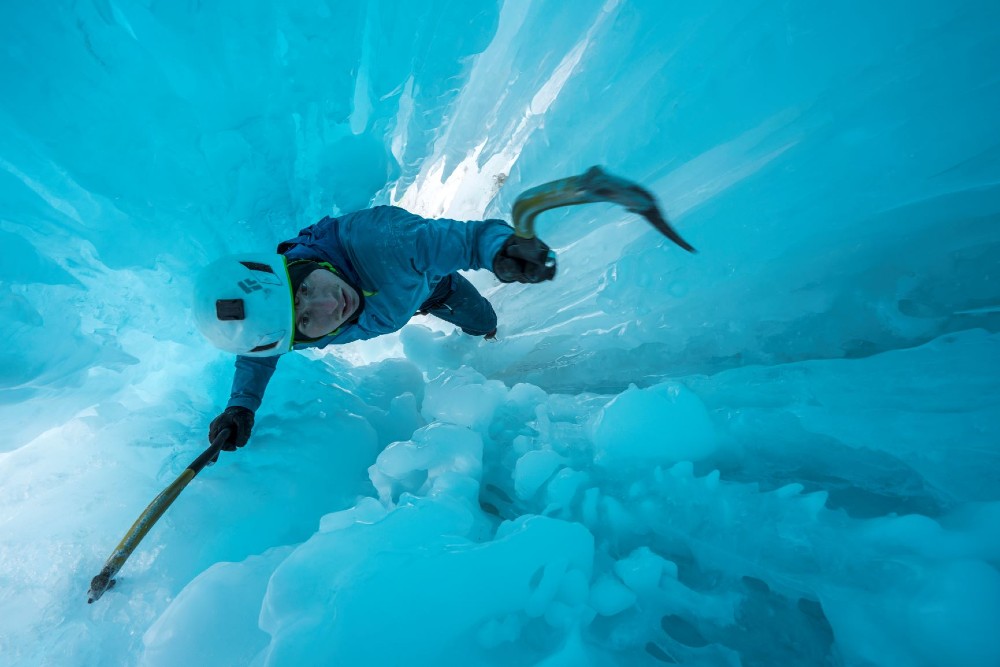
BTL: There were three cinematographers listed on the movie from what I saw. Were they also climbers? Who is shooting Marc’s climbs?
Rosen: Yeah, Jonathan Griffith, Austin Siadak are the two only guys who could film in an Alpine environment like that, really two of the very few people on earth. And then Brett Lowell was a cinematographer, he’s part of our core team. He filmed The Dawn Wall. This is a pretty rarefied group of people who are climbers and talented visual artists.
BTL: What was it like first meeting with Marc and trying to get him to talk on camera? You mentioned in the film that he’s quite camera-shy, and it’s tough getting him to sit down. How long did you first sit down with him and how did you warm him up to do that interview?
Mortimer: That first big interview? That’s a huge interview, it’s hours. Right, Nick? It’s like four hours.
Rosen: Yeah, the first interview we did with him was like, “Okay, we have him seated down. We’ve got the wolf in the enclosure. Let’s film.” That was kind of the most powerful interview we kept returning to throughout the film, just because, he was just so unvarnished and real.
Mortimer: We used some of that interview all the way at the end of the film, because some of the thematic stuff he was talking about in that first interview just carried through. We ended up doing seven or eight interviews with him? I mean, a lot of interviews. Some were half-hour, some were two hours. There’s some interview down in El Chaltén [in Argentina] that we used, but someone so unready, like no media training, and just through his facial expressions, you can really feel for him in his awkwardness in that interview. We love that, and we felt that really captured that side of his personality where there was just no script. You know when you ask someone a question and they’d just be like [does sound of quick perfected answer]. But it was just his pureness, and we ended up using that as verité in some ways in the film, because it’s so intimate with him. We started looking in that interview, not just for lines but for his great facial expressions as well. [chuckles]
BTL: Were you doing interviews with other climbers about him around the same time? And what year was that? Was it 2015 or 2016? Was it that long ago?
Rosen: 2016, 2017 were the first interviews.
Mortimer: When we’re in Squamish [in British Columbia] for the opening scene of the movie, and we have interviews with people in Squamish, that’s all happening when we’re in Squamish, right? We’re there for a couple of weeks, we’re filming Marc, we’re talking to all the different people then when we’re in Canmore [in Alberta, Canada]. A couple of those were maybe after, during the Bannf Festival or something, but most of those interviews are in Canmore when we’re up there, shooting with Marc, and there are all these Alpinists that live there. Kind of along the way, we were doing these interviews. Someone like Honnold, I can’t remember, maybe a year into the process or something? I can’t remember.
Rosen: I feel like the only one that wasn’t directly tied to Marc’s life…
Mortimer: Bernadette?
Rosen: No, because Bernadette was actually part of that scene in Canmore, and she really connected to that scene, but was Reinhold Messner. It was funny, because we were like, “Have you heard of Marc-André Leclerc,” and he’s like, “Two brothers? No, never heard of them.” Marc was such a student of history and so connected to the tradition of Alpinism and read all of Messner’s books and Messner is this incredible figure in that world, so we wanted to bring in that context, as well.
BTL: Are you generally going to a lot of these places together to film everything? Are you able to split up and maybe cover different things?
Rosen: We used to. Before we had kids and stuff, it was just Pete and I on the road. As the production gets more complicated, we get more and more stuff going on in our production company, and then, we have a lot more complicated lives.
Mortimer: We have another partner, Josh Lowell, he’s a great on-location director. He was there sometimes, and it would be him and Nick or me and him. It was kind of whoever was available, and often, it was kind of last minute.
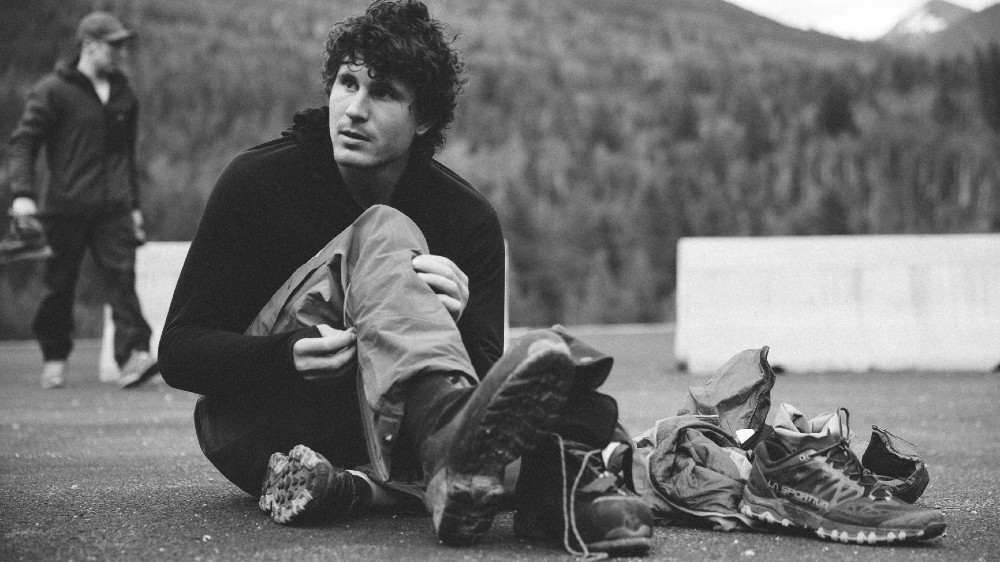
BTL: I have to imagine what you guys are doing has either gotten easier or just different due to social media, which wasn’t a thing 20 years ago. I feel it must be harder for people to get lost or go into hiding since everyone has a phone, except for Marc-Andre, obviously.
Mortimer: The advantage for us with the social media and that staff, is especially in a documentary, that found footage can be really valuable to tell the story, so there’s almost more documentation. Obviously, we use some of that stuff in the chasing Marc scene when he’s off on a journey, and then, also, the ability to give Marc a little camera to film, so that he can be up there alone where he doesn’t want us, but he’s happy to pull out a camera and shoot some personal footage. All of that is actually an advantage for us, for telling the story
BTL: Were either of you down in Patagonia to shoot some stuff?
Rosen: No, on this shoot, we sent that guy Austin, who did it. Pete and I had filmed down there before. When you go down to film there, you can just wait in the rain and the storms for months at a time. It was almost a relief that Marc was like, “I don’t want you to go. I’m bringing Austin,” and I was like, “Oh, that’ll work pretty sweet.” [laughs]
Mortimer: We got him his camera and encouraged him as much to use it, but Marc went down there in the winter, and like nobody goes there in the winter. There’s a reason he’s there in the winter, because that place is packed in those three months when it gets the best weather. It’s a small town, and it just balloons with trekkers and climbers, and those are distractions. He is down there, and I’m not sure if he wants to climb in the winter, I think he wants to climb when no one else is down there. Austin is a bit of a lone wolf, also, and those guys have climbed together and they’re the same age, and Austin is burly and badass and can carry heavy loads, and he’s not going to get himself into a situation. At that point, it was just like 100% on Marc’s terms. He’s telling us what’s happening, and we’re doing it.
BTL: Was Austin sending you some footage during their days there in case you needed to give him any tips on shooting?
Rosen: We’ve worked with Austin, and we’ve known him for years, and we know he’s a pro. He was checking in with us by phone, but he had that covered.
BTL: How do you edit a movie like this where you have so many sources and different types of footage? Is this post like a year or longer just to get everything working together? (NOTE: The second half of this response talks about the last act of the movie, and if you aren’t familiar with Marc-André, we suggest you stop reading here and watch the movie before reading the next couple paragraphs.)
Mortimer: Definitely longer than a year. I think we’re iterating as we’re gone, but we really didn’t know where this story was going, and like when it was going to end while we were filming. I think after Cerro Torre, we felt that was the culmination of this part of Marc’s two years, more or less, from when we first started filming with them. He says this in the film — these things were leading to this moment in his mind. He was taking the steps, so at that point, we were like, “Oh, cool, This is our story.” It starts with a completely unknown guy, and he does this amazing thing at the end, and we track that journey. We felt really great about that and putting that into historical context. And then, obviously, it was soon after that, the tragedy struck up in Alaska.
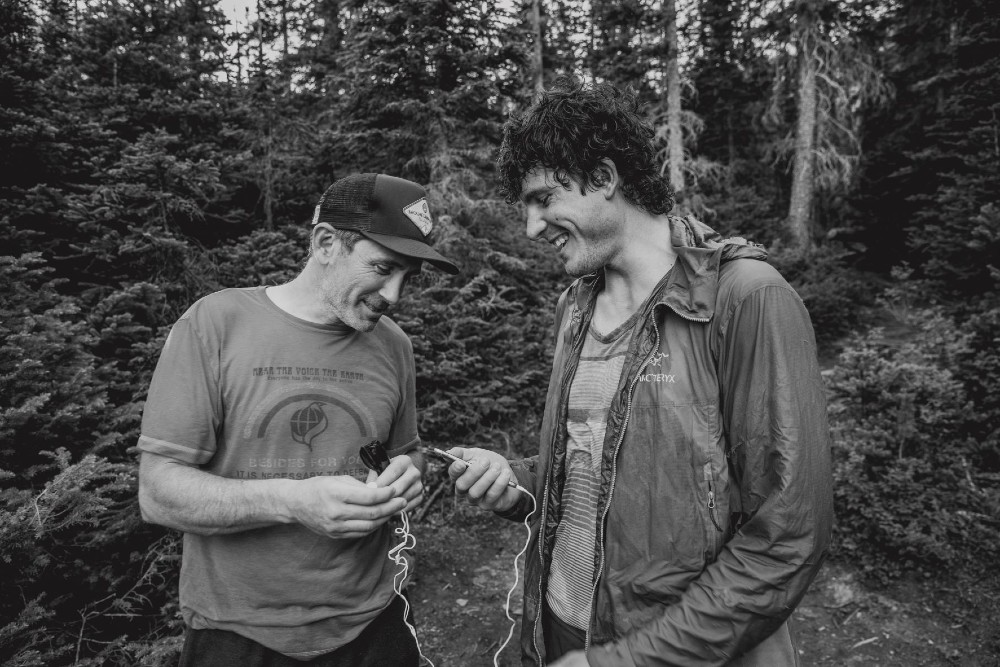
We were in post-production, and we stepped back from editing, and, we were just close with all his people, and, and then everyone was like, “You gotta make this movie.” So then we went back in. We knew we needed the post-tragedy to be part of the story. Those people were so close to Marc, and that’s just part of the reality of what he’s doing. To try to end the film with a title or something, there was no way we were going to do that. But it took a while before we were comfortable filming. There was some really serious grieving and processing. We just didn’t feel appropriate to be in there for a little while. And then when it felt right, we filmed the final interviews.
Rosen: What was lucky for us, just from an editing standpoint, we gave them time. We knew it was going to be Michelle, his Mom, and Brett, who we wanted to spend the most time with, to sort of unpack what had happened, because these two powerful women that had kind of shaped Marc, with time, they had really figured it out for themselves, how they were going to move forward in the world and how they had processed this, Brett through her own climbing and Michelle through a really sort of deeply, philosophical approach that she had taken with this boy since Day One. Once we did go back and film them, there wasn’t much to figure out. They told us the things that we needed for the ending of the film.
BTL: What was the crossover with The Dawn Wall? I think that came out in 2018 and Free Solo came out a few months later, and I’m not sure if Jean-Marc was mentioned in either, but I would have known him before seeing this movie, I would think.
Mortimer: So the crossover is The Dawn Wall was having its US premiere at South by Southwest, and I was heading down there to go to the premiere and got the news that Marc was missing Alaska. Instead of going to the Dawn Wall premiere, I flew up to Alaska… Nick and I both flew to Alaska and just tried to help. It was just waiting. It was a bad weather situation, and they were missing. That’s the crux of your timeline.
The Alpinist will play in theaters nationwide TONIGHT, Tuesday, Sept. 7, through Fathom Events, and then it will continue playing in theaters across the country starting Friday, Sept. 10.
All photos courtesy Red Bull Media House, except where noted.





